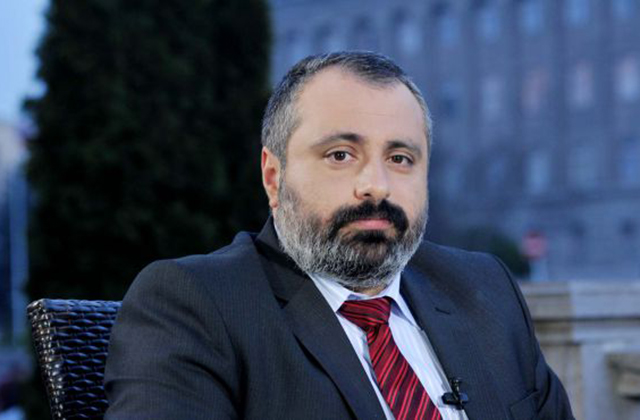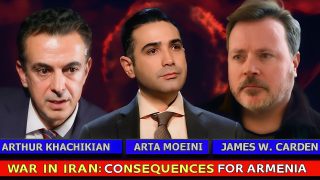After April war significant changes took place in Artsakh: Davit Babayan

After April war significant changes took place in Artsakh. First of all improvements were made in the defense system, Davit Babayan – spokesman of Artsakh President, said in an interview with “Armenpress”, speaking about the works carried out over the border protection process after the April war.
Mr. Babayan, what lessons have we learned a year later after the April war, and what progress was recorded on strengthening the border protection?
After the April war significant changes were made in Artsakh. First of all, improvements, innovations were made in the defense system. As we saw, the April war was considerably different from the 1991-1994 war for the simple reason that this time more modern weaponry, drone, artillery was used. Considering all these, major changes were made: of course, these was being also done before the April war, but this time it was carried out more targeted. There had been many innovations in the defense system, and that process is continuous, it will never stop as long as we have an aggressive neighbor, adversary.
Have we sufficiently presented our facts over Azerbaijan’s military crimes during the April war to the international community? What can you say on the response of international community over this?
We have presented the facts over Azerbaijan’s atrocities, gross violations of human rights, international norms in various international platforms. This was done both through documents, photos and video materials. By using various circles we almost everywhere presented those facts. In terms of presentation, this process can be considered as satisfactory. However, we need to make sure that the criminals will be held accountable.
There are still problems in this sense, but I think calling the guilty ones to be held accountable is a matter of time. Today we see that all these criminals are being awarded, are considered heroes by the Azerbaijani leadership. Azerbaijan’s public with this shows that there are serious problems in connection with the value system. Official Baku adopted anti-Armenian policy, and power that is guided by this policy is just abnormal. One cannot hate someone just because he/she belongs to other nation, religion.
As we see, Azerbaijan continues making militant statements, as well as conducts border operations. At this stage what step must the Armenian side take both in military and political field?
First of all, we always need to keep our borders firm, our army must always be strong. This is the most reliable guarantee of the border protection. Of course, the Azerbaijani side will do everything to somehow justify its moral, material losses before its public, which means that this aggression will always exist.
That’s why the more we are strong and united, the higher the level of our border protection will be. By unleashing the April war the Azerbaijani leadership was convinced that Armenians are weak, and they can win. But as we saw, they failed, but this doesn’t mean that they will not try to undermine our unity with various measures, including through traitor Vahan Martirosyan and people like him. Yes, the Azerbaijani side will try to undermine our unity, but I am more than convinced that it will result in failure.
The OSCE Minsk Group Co-Chairs visited Armenia, Artsakh, what key emphasis will you identify from their visit?
The most important emphasis is that the three co-chairing countries are committed to their vision, which is the conflict has no military solution. They understand that the settlement of the Karabakh conflict is a long-term process. It is necessary to continue the work first of all for maintaining peace and stability, to start from less politically sensitive issues, for instance, the investigative mechanisms for border incidents, in general, to give a new impetus to the process. If there is no progress at this level, it will be meaningless to speak about complex political issues, and it will not be possible to reach progress here. Therefore, currently major directions are maintenance of stability, installation of mechanisms.
Overnight April 1-2 Azerbaijan unleashed large-scale military operations in the Artsakh-Azerbaijan line of contact. The Armenian side took countermeasures as a result of which the Azerbaijani forces suffered huge human and material losses. Due to the four-day war both sides suffered losses and wounded.
On April 5 ceasefire agreement was reached as a result of the meeting between Chiefs of Staff of the Armed Forces of Armenia and Azerbaijan in Moscow. After the April large-scale military operations, the Presidents of Armenia and Azerbaijan met firstly in Vienna with the participation of Foreign Ministers of France, US and Russia. At the meeting several agreements were reached. In particular, the Presidents reaffirmed their commitment to the ceasefire and peaceful settlement of the conflict.
They agreed to complete the works on installing OSCE investigative mechanisms in the line of contact in a short period of time and increase the number of international observers in the conflict zone, by expanding the powers of the Personal Representative of the OSCE Chairperson-in-Office. The next meeting was held in June in St. Petersburg between the Presidents of Armenia, Russia and Azerbaijan during which the agreements reached in Vienna were reaffirmed. Till now the agreements are not implemented due to Azerbaijan’s unconstructive policy.

























